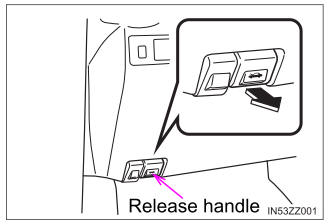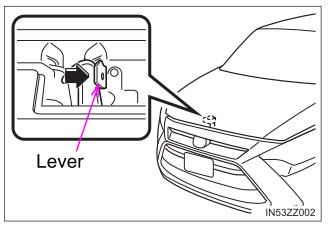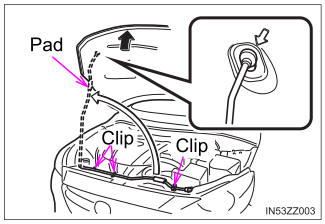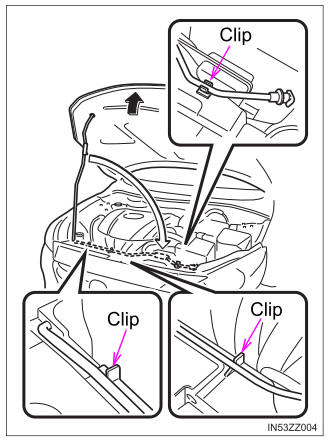Toyota Yaris: Owner Maintenance / Hood
- With the vehicle parked, pull the
release handle to unlock the
hood.

- Insert your hand into the hood
opening, slide the latch lever to
the right, and lift up the hood.

- Grasp the support rod in the
padded area and secure it in
the support rod hole indicated
by the arrow to hold the hood
open.

Closing the Hood
- Check under the hood area to make certain all filler caps are in place and all loose items (e.g. tools, oil containers, etc.) have been removed.
- Lift the hood, grasp the padded
area on the support rod, and
secure the support rod in the
clip. Verify that the support rod
is secured in the clip before
closing the hood.

- Lower the hood slowly to a height of about 7.9 in. (200 mm) above its closed position and then let it drop.
WARNING
Always check that the hood is closed and securely locked
A hood that is not closed and securely locked is dangerous as it could fly open while the vehicle is moving and block the driver’s vision which could result in a serious accident.
NOTICE
When closing the hood, do not push it excessively such as by applying your weight. Otherwise, the hood could be deformed.
 Owner Maintenance Precautions
Owner Maintenance Precautions
The owner or a qualified service technician should make these vehicle
inspections at the indicated intervals to ensure safe and dependable
operation...
Other information:
Toyota Yaris XP210 (2020-2026) Reapir and Service Manual: Precaution
PRECAUTION PRECAUTION FOR DISCONNECTING CABLE FROM NEGATIVE AUXILIARY BATTERY TERMINAL NOTICE: After the ignition switch is turned off, there may be waiting time before disconnecting the cable from the negative (-) auxiliary battery terminal. Click here When disconnecting and reconnecting the auxiliary battery Click here HINT: When disconnecting and reconnecting the auxiliary battery, there is an automatic learning function that completes learning when the respective system is used...
Toyota Yaris XP210 (2020-2026) Reapir and Service Manual: Precaution
PRECAUTION CAN COMMUNICATION SYSTEM TROUBLESHOOTING (a) Because the order of diagnosis is important to allow correct diagnosis, make sure to begin troubleshooting using How to Proceed with Troubleshooting when CAN communication system related DTCs are output...
Categories
- Manuals Home
- Toyota Yaris Owners Manual
- Toyota Yaris Service Manual
- Opening and Closing the Liftgate/Trunk Lid
- Power Integration No.1 System Missing Message (B235287,B235587,B235787-B235987)
- Fuel Gauge
- New on site
- Most important about car
Break-In Period
No special break-in is necessary, but a few precautions in the first 600 miles (1,000 km) may add to the performance, economy, and life of the vehicle.
Do not race the engine. Do not maintain one constant speed, either slow or fast, for a long period of time. Do not drive constantly at full-throttle or high engine rpm for extended periods of time. Avoid unnecessary hard stops. Avoid full-throttle starts.
Copyright © 2026 www.toyaris4.com

